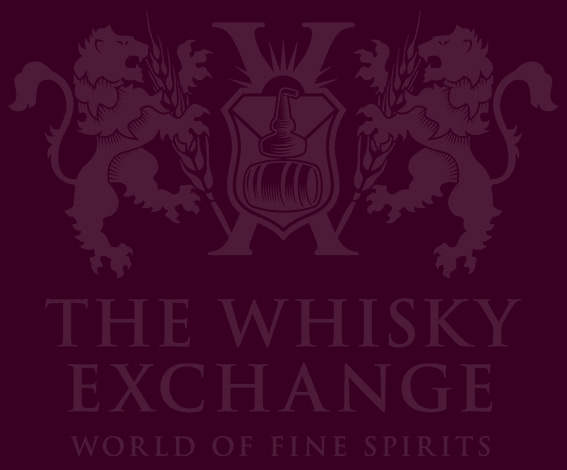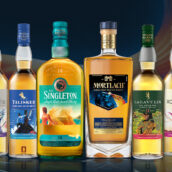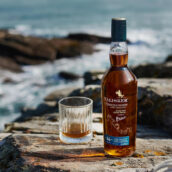
Diageo’s Nick Morgan: ‘A lot of the ill-informed views seem to come from people who have been in the category for a short amount of time, with not much understanding of how the whisky industry works’
When I told Diageo’s Nick Morgan that I’d like to discuss the subject of No Age Statement (NAS) whisky, there was a roll of the eyes and a rather weary sigh. This reaction is explained in part by the frequent brickbats hurled at NAS whiskies, particularly on social media, something that Morgan keeps a keen eye on.
As head of whisky outreach, Morgan is essentially the public face of Diageo for journalists, bloggers and all those who write or talk about whisky. But despite the company’s ultra-corporate image, it was encouraging he was happy to speak openly about what remains a contentious topic.
Diageo’s latest NAS release is Talisker Skye, the third NAS Talisker to hit UK shelves in as many years, following Storm and Port Ruighe. The launch has raised alarm bells that its arrival will signal the untimely end of an established age-statement bottling: the 10 Year Old.
Fears that the arrival of a new NAS whisky automatically means the disappearance of a much-loved bottling are not totally ungrounded: Macallan’s 1824 Series spelled the end of the 10, 12 and 15yo; and this year, The Glenlivet 12yo will be replaced in the UK and Germany by Founder’s Reserve. But rumours of Talisker 10’s demise appear to have been greatly exaggerated, and Diageo have already confirmed that it is here to stay.
What does Morgan make of the negative feedback? ‘Sadly, I think a lot of the more intemperate and ill-informed views seem to come from people who have been in the category for a short amount of time, with not much understanding of how the whisky industry works,’ he says. ‘A lot of the comment is driven by hot-headed ignorance.
‘There’s increasing demand for Scotch malt whisky, but it is a finite product, and in the face of increasing demand, it becomes increasingly difficult to guarantee a supply of aged stock. Sometimes people say “Oh, so you’re running out, then?” Actually, we just haven’t got enough, which is a very different situation.’
Rumours aside, from a logical standpoint, you would think that it would be commercial suicide to do away with the flagship bottling of a 100,000-case-a-year brand, one which has seen significant investment from Diageo over the past 15 years.
AGE = GOOD?
But while the flurry of NAS whiskies may not mean the death knell to popular age-statement bottles, Morgan does admit that companies – including Diageo – are responsible for the notion that age = good: ‘When the rush towards single malts occurred in the late 1970s and early 1980s,’ he says, ‘the easiest thing to create a credential was putting numbers on bottles. It justified higher price points and it gave them integrity. [The industry] decided to teach people that age equated to value, so in some ways, it’s a situation of our own making.’
Not only that, but with some NAS whiskies getting a critical mauling coupled with the perception that prices are creeping up, then you have a situation, says Morgan, where the ‘bond of trust’ between producer and consumer has been broken, something he describes as ‘very regrettable’.
But on the NAS concept as a whole, Morgan is unrepentant. He believes that their existence is born out of necessity and, in fact, makes life easier for distillers and blenders: ‘It’s much easier to give yourself the flexibility of producing non-age-statement whisky,’ he explains. ‘It gives our people much greater creativity when producing a blended single malt – 99% of single malts are “blends”, and that is how the people who put them together think of it. And people might not like this, but it is a fact – age-statement whiskies are, largely, rarities. Almost 80% of Scotch whisky sold does not have an age statement.’
It’s a tricky one. Us whisky fans are a passionate bunch, and if we get a whiff that our favourite malt may be about to disappear, then we are understandably upset. However, distilleries have to take a more pragmatic view and put measures in place to ensure they can balance inventory and stock levels so that there are no nasty surprises a decade or two down the line. And if that’s the case, the existence of NAS whiskies will actually do more to ensure the long-term survival of those beloved age-statement whiskies – something even the most rabid keyboard warrior would be happy to raise a glass to.










 Enjoy responsibly
Enjoy responsibly
Comments
RT @WhiskyExchange: Over on the blog, Diageo’s Nick Morgan answers the NAS whisky critics: http://t.co/34AHGCV5M6
NAS whisky – Diageo speaks out: http://t.co/I8k3dhV7Lo via @whiskyexchange
NAS whisky – Diageo speaks out: http://t.co/VzyDC95QLL
RT @WhiskyExchange: Over on the blog, Diageo’s Nick Morgan answers the NAS whisky critics: http://t.co/34AHGCV5M6
NAS whisky – Diageo speaks out http://t.co/J9ObMN1cT4 http://t.co/jhJfHDJv8Z
RT @WhiskyExchange: Over on the blog, Diageo’s Nick Morgan answers the NAS whisky critics: http://t.co/34AHGCV5M6
RT @TWEBlog: New post: NAS whisky – Diageo speaks out: http://t.co/nmTWJDcFih
RT @WhiskyExchange: Over on the blog, Diageo’s Nick Morgan answers the NAS whisky critics: http://t.co/34AHGCV5M6
@TWEBlog Right. Forgot how “ignorant” guys like @ralfystuff @Whiskyfun @WhiskyTasting etc are. Wake up, Mr. Morgan. Way to alienate.
@Allthingswhisky @TWEBlog 99% is sold as NAS. Most of that is £ 15 blended, but that doesn’t matter anymore.
Nice piece, Stuart. But not much of a response I feel. He puts it a bit more eloquent, but in essence Mr. Morgan says that the negative feedback comes from ignorant people. And then he continues to say it is regrettable that the bond of trust between consumer and producer is broken. Well, this is not the way to repair it.
In the meanwhile he explains NAS-whiskies are born out of necessity, which I interpret to mean that Diageo would’ve rather sticked to age-statement whiskies. So why then judge consumers for criticizing a product the company itself would’ve avoided if it at all possible?
RT @WhiskyExchange: Over on the blog, Diageo’s Nick Morgan answers the NAS whisky critics: http://t.co/34AHGCV5M6
NAS whisky – Diageo’s @nicholasjmorgan speaks out: http://t.co/RZ15BO5cpC via @whiskyexchange
@TWEBlog @Allthingswhisky He has a fair point. Most, but not all, of the whining is pretty much that: whining. Some make valid points.
RT @ewanmorgan: NAS whisky – Diageo’s @nicholasjmorgan speaks out: http://t.co/RZ15BO5cpC via @whiskyexchange
@MaltNerd @TWEBlog He ignores the fact that NAS is not a type of whisky. It’s a type of advertising. Designed to hide info from consumers.
@MaltNerd @TWEBlog No opposition here to vatting young & old malts. Just to NAS and unchecked pricing structures. #InTheDark
@Allthingswhisky @TWEBlog Age statements are the same thing. They change batch to batch and evolve over time, making “10” just another brand
@TWEBlog I’m happy to judge each on its own merits. I’d like more info on the bottle and would like price to reflect contents.
RT @TWEBlog: New post: NAS whisky – Diageo speaks out: http://t.co/nmTWJDcFih
@MaltNerd @TWEBlog But numbers are an indicator of what to expect in terms of rough edges and justify distillery’s investment.
@Allthingswhisky @TWEBlog leapfrog 10 and glengoyne 10 are pretty similar then in terms of rough edges?
Interesting article and comments. RT: “@TWEBlog: New post: NAS whisky – Diageo speaks out: http://t.co/HIVTlsPPeo”
@MaltNerd @TWEBlog Absolutely. Vastly different profiles and wood policies, but neither boasting really youthful notes.
RT @WhiskyGuyRy: Interesting article and comments. RT: “@TWEBlog: New post: NAS whisky – Diageo speaks out: http://t.co/HIVTlsPPeo”
@Allthingswhisky @TWEBlog I disagree. Leapfrog is obviously too young at 10, full of rough edges and candy notes, behind the ash.
RT @WhiskyExchange: Over on the blog, Diageo’s Nick Morgan answers the NAS whisky critics: http://t.co/34AHGCV5M6
@MaltNerd @TWEBlog nothing wrong with difference of opinion. Laph 10 has nice fruits. Its ‘edges’ are from its phenolic side, not youth.
@Allthingswhisky @TWEBlog those phenolic notes diminish with age into a lovely smoked smoothness, so are directly related to youth.
@MaltNerd @TWEBlog Apples and oranges. Smoke and phenols fade over time, yes, but that parallels maturation. Not tied to mature/undermature.
@MaltNerd @Allthingswhisky @TWEBlog This isn’t a counter-attack to Dominic Roskrow’s article http://t.co/Quyi5dUCYZ ?
@tastydram @MaltNerd @TWEBlog Sorry, what do you mean? That Morgan is responding to Dom’s criticism?
@Allthingswhisky @TWEBlog I respectfully disagree. If it’s a fault that ages out then the whisky with the “fault” is under-matured.
@MaltNerd @TWEBlog Sorry, not following you. Do you mean that the heavy phenols in Laph are a fault?
@Allthingswhisky @MaltNerd @TWEBlog Yes. Timing of the release is not really a coincidence to me.
@tastydram @MaltNerd @TWEBlog Gotcha. And yes, you’re probably right.
@Allthingswhisky @tastydram @MaltNerd @TWEBlog Not likely; I did the interview three weeks ago.
@Allthingswhisky @tastydram @MaltNerd @TWEBlog Not likely; I did the interview three weeks ago.
@Allthingswhisky @TWEBlog the way they are so wildly imbalanced in the 10 is. Only 2 years more and it could be wonderful!
@TWEBlog @tastydram @MaltNerd Ahhh. Thanks for clarifying. So…he’s just taking aim at dissidents like me. 🙂 Hahaha.
@Allthingswhisky @TWEBlog the economics of laph demand a 10 just as the present economics of the industry demand NAS.
@MaltNerd @TWEBlog I think you’re in a minority of whisky drinkers that finds the 10 unbalanced. It’s a classic for a reason. Good to differ
@Allthingswhisky @TWEBlog just as with age statements, some are good and some are bad and you try each one and decide where they fall.
@Allthingswhisky @TWEBlog sanity is not statistical! 😉
@MaltNerd @TWEBlog Um, no. Laph 10 has been around for ages. Nothing to do with economics. It’s a staple of the distillery.
@MaltNerd @TWEBlog Missing the point. Yes, some NAS ARE good. But still a blank cheque marketing scheme for brands.
@Allthingswhisky @TWEBlog such schemes have always been around, even in the days b4 NAS: witness the Managers Dram BS or travel exclusives
@Allthingswhisky @TWEBlog @MaltNerd I think most large company’s have some articles like that on hold to release when there’s a rouse.
@MaltNerd @TWEBlog …yep. But it’s getting worse, and I won’t help perpetuate it. History teaches that silence is dangerous.
@Allthingswhisky @TWEBlog dramatic! I do get your point but I also think Morgan has a legitimate pov.
@Allthingswhisky @TWEBlog of course it has to do with economics. That’s why it was released at that age to begin with. Anyway, not the point
@MaltNerd @TWEBlog Of course he does. Just seen from the other side. I can’t (or won’t) relate. As he can’t (or won’t) relate to mine.
RT @TWEBlog: New post: NAS whisky – Diageo speaks out: http://t.co/nmTWJDcFih
RT @WhiskyExchange: Over on the blog, Diageo’s Nick Morgan answers the NAS whisky critics: http://t.co/34AHGCV5M6
RT @WhiskyExchange: Over on the blog, Diageo’s Nick Morgan answers the NAS whisky critics: http://t.co/34AHGCV5M6
“There’s increasing demand for Scotch malt whisky”. Really??? I thought sales of Scotch were down. In which case, his argument falls a bit flat in places.
“‘It’s much easier to give yourself the flexibility of producing non-age-statement whisky – It gives our people much greater creativity when producing a blended single malt’. Since when was this about doing what is flexible for the workforce? I thought it was about giving the consumer what they demand or will like. Admittedly some of the NAS whiskies are terrific but for every Laphroaig Quarter Cask, Corryvreckan or a’bunadh there’s an Auchentoshan Classic or Ardmore Legacy. Still, all this makes you realise how good some of the classic entry level malts were, e.g. Laphroaig 10, Glenlivet 12, etc. and we’ve probably taken these for granted.
I do take the point, though, about the long-term survival of the aged whiskies but I can see the prices of these skyrocketing. Let’s hope not.
80% of scotch whiskey being NAS is insanely disingenuous. Johnny Walker is one of the the biggest brands in the freakin world and is blended so of course its NAS. “everyone else does it” doesnt mean anything when you’re talking about blended whiskey, guys.
Thanks for interviewing Nick.I read it with considerable interest.
You left out Dark Storm. The perception is that Storm was so disliked that they had to go back to the drawing board. Dark Storm was only slightly less disliked so Port Ruighe was created. If these hadn’t been created would we see sufficient quantity in the future or is this so called shortage going to be self perpetual based on the creation of these malts. Diageo is welcome to release the volume produced and sold to prove me wrong.
Does he mean critics in the category like Ralfy, Dom and Malt Maniacs?
No one is trying to stifle anyones creativity, although that is often the excuse given by producers perhaps as a way to sideline the issue, we just want some justification for paying the fee requested.
Perhaps you would have more success admitting that you found some barrels in the back and because of faulty record keeping you don’t know how old they are so you mixed them together and here’s the new product. Yeah. Go with that.
Richard, just to clarify: I deliberately didn’t mention Dark Storm because it was a travel-retail-only product, ie it wasn’t an official UK release.
Diageo investment? without the product Diageo is nothing. Whisky could do without them not vice versa
An interesting and balanced response. Nice to see flagging of age statements = good being old marketing techniques.
I suspect much of what he says will be ignored. With online debates we tend to absorb those statements and facts to align with what we want to believe anyway, irrespective of balance. Whether it’s a grand conspiracy of the whisky industry (c’mon, sheeple!) or more avant-garde techniques (remember when Bruichladdich used to bang on about NAS being really liberating?), there’s a truth for everyone.
To be honest, I genuinely don’t understand the frustrations of the debate. No one is forcing anyone to drink whisky with or without a number… Last time I checked, there was still consumer choice.
An interesting post for the defence side of the whisky ‘no age statement’ debate: http://t.co/NJ3gvVFUKl
RT @MaltReview: An interesting post for the defence side of the whisky ‘no age statement’ debate: http://t.co/NJ3gvVFUKl
http://t.co/0jOwGEYfv4
NAS whisky – Diageo speaks out: http://t.co/2X19opR2HK via @whiskyexchange
I buy and enjoy NAS whiskies. I am just looking for good whisky and good value when I purchase a bottle.
One of the best commentaries I’ve seen on NAS http://t.co/PvlgteOhxi Cheers & kudos to @nicholasjmorgan
RT @WhiskyExchange: Over on the blog, Diageo’s Nick Morgan answers the NAS whisky critics: http://t.co/34AHGCV5M6
NAS whisky – Diageo speaks out: http://t.co/BV5f8jWecd via @whiskyexchange
NAS whisky – Diageo speaks out: http://t.co/Lx8LJqBoEJ via @whiskyexchange
RT @WhiskyAndWisdom: One of the best commentaries I’ve seen on NAS http://t.co/PvlgteOhxi Cheers & kudos to @nicholasjmorgan
NAS whisky – Diageo speaks out: http://t.co/ykk7HoRZFd via @whiskyexchange #scotch #whisky #nas
RT @ewangunn: NAS whisky – Diageo speaks out: http://t.co/ykk7HoRZFd via @whiskyexchange #scotch #whisky #nas
@WhiskyExchange “Rabid Keyboard Warrior”, is that the next Highland Park release?
RT @WhiskyAndWisdom: One of the best commentaries I’ve seen on NAS http://t.co/PvlgteOhxi Cheers & kudos to @nicholasjmorgan
Say goodbye to your “X year old” whiskies? http://t.co/Rrn2wVI9h0 .@gavyap
[…] è stata pubblicata un’intervista a Nick Morgan (che potete leggere in inglese qui) che cerca di fare chiarezza riguardo i tanto spinti dalle distillerie “No Age […]
RT @WhiskyAndWisdom: One of the best commentaries I’ve seen on NAS http://t.co/PvlgteOhxi Cheers & kudos to @nicholasjmorgan
RT @WhiskyExchange: Over on the blog, Diageo’s Nick Morgan answers the NAS whisky critics: http://t.co/34AHGCV5M6
Interesting read on NAS! http://t.co/pyTgdFlN1E @MacCocktail @foodiewinoSF @drinkmemag @SpeysideCentre @NancyMGuillory @ValBradshaw
RT @That_Whisky_Guy: Interesting read on NAS! http://t.co/pyTgdFlN1E @MacCocktail @foodiewinoSF @drinkmemag @SpeysideCentre @NancyMGuillory…
RT @That_Whisky_Guy: Interesting read on NAS! http://t.co/pyTgdFlN1E @MacCocktail @foodiewinoSF @drinkmemag @SpeysideCentre @NancyMGuillory…
RT @That_Whisky_Guy: Interesting read on NAS! http://t.co/pyTgdFlN1E @MacCocktail @foodiewinoSF @drinkmemag @SpeysideCentre @NancyMGuillory…
RT @That_Whisky_Guy: Interesting read on NAS! http://t.co/pyTgdFlN1E @MacCocktail @foodiewinoSF @drinkmemag @SpeysideCentre @NancyMGuillory…
NAS whisky – Diageo speaks out: http://t.co/4CiOMSi6rj
RT @VanekWhiskey: NAS whisky – Diageo speaks out: http://t.co/4CiOMSi6rj
RT @VanekWhiskey: NAS whisky – Diageo speaks out: http://t.co/4CiOMSi6rj
RT @VanekWhiskey: NAS whisky – Diageo speaks out: http://t.co/4CiOMSi6rj
NAS whisky – Diageo speaks out: http://t.co/9ghOAgBov9 via @whiskyexchange
NAS whisky – Diageo speaks out: http://t.co/aNXkqzEGQq via @whiskyexchange
[…] The Whisky Exchange har intervjuet Diageos Nick Morgan om NAS-fenomenet. Det har ført til mange diskusjoner på diverse fora, og mange er oppgitt over vage svar, men det […]
Of course Diageo’s Nick Morgan would roll his eyes –> “NAS WHISKY – DIAGEO SPEAKS OUT” via @WhiskyExchange http://t.co/h1ci53bZfP
“A lot of the comment is driven by hot-headed ignorance”, coming from a guy who, just recently, DENIED that NAS was born out of necessity and, instead said it was about “running out of numbers”? It is to laugh!
“Morgan believes the trend for dropping age statements is partly down to “the relentless drive for innovation in the single malt category where every week there have to be new offerings”. He adds: “Frankly it’s less about running out of stock, than running out of numbers.” http://www.thespiritsbusiness.com/2014/07/will-consumers-embrace-no-age-statement-scotch/2/
We’re supposed to now trusts the new, completely self-contradictory, message about age, that it matters only when the industry wants to talk about it (with age statements), but that it’s irrelevant when it comes to NAS? Nick and Co. need to take their Ph.Ds back to the marketing drawing board on that one.
[…] dieser Woche schlug ein Post im Blog von The Whisky Exchange ziemlich hohe Wellen. Stuart hatte die Gelegenheit, sich mit Nick Morgan von Diageo zu unterhalten. […]
NAS whisky – Diageo speaks out: http://t.co/lzXGA5fmdR via @whiskyexchange
Mark, I think you’ve totally missed the point about NAS whiskies. First off, I don’t know of anyone who is seriously suggesting some sort of grand conspiracy, but it does make a nice straw man for the pro-NAS side. There are several problems with the NAS trend. The first is that pretending that NAS whiskies give producers “more flexibility” is clearly a response to a lack of fully-mature stocks. When they had lots of mature whisky, they were happy to tell us how much age mattered. Secondly, an age statement gives the consumer a rough idea of how much the whisky in the bottle cost to make. The only reason to avoid adding an age statement is if you think the youngest whisky is so young that people won’t buy it. SO the producer tricks the consumer into buying something they wouldn’t otherwise. Perfectly legal, but also a factor in breaking the “‘bond of trust” Mr. Morgan is so concerned about. And finally, no one is arguing consumer choice doesn’t exist, but choice is being diminished, with Macallan and Glenlivet doing away with at least some of their age statement bottles. In addition to an actual loss of choice on the shelf, with more whisky going into NAS bottlings (which for the most part are mediocre at best), that means less is going into bottles with an age on them. The frustration you don’t seem to understand is that this is being driven by companies determined to squeeze every penny out of the consumers. I don’t know anyone who enjoys being seen that way.
All very good points, Chris, and thanks for making them. As many want to point out, age isn’t a “guarantee of quality”, but neither is ABV, non-chill filtration, natural colour or single casking, so that’s no more an argument against leaving age off the label than it is for leaving that other information off as well. Apart from some idea of the level of industry investment in bringing a product to market, what age information provides is a frame of reference for those who have tried other whiskies of many ages and know that any of them would be very different in character at a very different age, and the industry’s desire to remove that frame of reference for its own purposes of profit making isn’t more important to consumers than their right to know what they are buying. Age doesn’t matter to a whisky’s development? Very well, show me 5 whiskies, aged 5, 15, 25, 35 and 45, which are otherwise all identical in character.
Whisky is casked, not just to store it, but to improve it and there is simply no argument to be made that age isn’t valid production information, as shown by the fact that distillation dates are still kept on every cask the industry itself produces. It’s not up to the industry to pre-empt consumers opinion on how, where or when age should be judged important by removing age information with NAS, and only where the industry itself doesn’t want to use age as a marketing point. What else don’t consumers need to know and why is the industry the arbiter of that when it’s changed its mind on the topic itself in the past so that now age is, paradoxically, BOTH important and unimportant; age was formerly considered important and now it isn’t, but ONLY where the industry doesn’t still want to discuss age with age statement to premiumize prices?
[…] think things really came to a head last week when The Whisky Exchange blog posted an interview with Diageo’s Nick Morgan. I’m not sure I’ve ever read such a condescending load of tripe from someone within […]
Today’s link is a chat on No Age Statement (NAS) whiskies with Dr. Nick Morgan, head of “Whisky Outreach” at… http://t.co/np8mPAzRlE
No sorry disagree. So because there is a finite supply rather than accept that without compromising on quality we’ve all to accept there may be covert changing of what a brand means. I’m out and won’t be buying any NAS whiskies
Speaking of “bond of trust”, I noticed, after a particularly disappointing glass of Oban (a Diageo whisky), that the label now says simply “Oban 14”. Nowhere does it specifically say “14 years old”, or indicate the distillation/bottling dates.
As more and more NAS whisky appears, at higher and higher prices, I am convinced that often times a dram of 30 year old is going in to vats of 5 year old whisky and coming out as “Old Captain MacHaggis’s ancient recipe very special blend traditional Scots Wa Hae highland and island rare old limited edition.” For only $200 a bottle.
Ikke tilfreds med trenden NAS
[…] нуждается. Ну а тема не нова, еще Ник Морган из Диаджио еще в марте в блоге TWE заявил, что критикуют NAS-виски в основном невежи, только что […]
I think that you have totally missed the point. Many of us are against NAS because increasing lack of information decreases our appreciation for a whisky. There is nothing intrinsically wrong with a young 5/6/7/8 year old whisky and as many Distilleries have shown, there is much to enjoy and learn from young spirit, if matured in quality casks. The whole problem is that the Whisky industry doesn’t trust us, the consumer to understand this! They patronize us instead by purposely withholding the age of the whiskies used and give the product some fancy name in the hope that we won’t notice.
The bottom line is that they are afraid that stating that the youngest whisky in this bottling is 5 years old might negatively affect sales. To this I have two responses. 1. With the right marketing with words like fresh, clean, youthful, vibrant, it can be made to appeal. 2. The age statement does not have to be blazened across the front but can appear at the back somewhere. You can even be very ckever and state age of distilling and year of bottling and leave it up to those who want to know to work it out.
Withholding information like the age of the youngest whisky used or indeed the types of casks used is never a good thing and leads to a feeling by many consumers of dishonesty.
[…] I was a bit concerned. I thought for sure that I wouldn’t like it (we’ll call this Whisky Blogger Hubris), especially when you consider my recent experience with the Hibiki 21 which I found to be way too […]
Any ‘creativity’ at Diageo has been in its boardroom not amongst its ‘blenders’.
We whiskey consumers are having a thick wodge of wool pulled over our eyes (and, these days, it tends not to be locally produced & crafted wool but international corporate wool – generously laced with international corporate B.S.!)
For many, the referenced ‘bond of trust’ has already been well and truly severed.
The NAS trend is a marketing move aimed at increasing profit margins through designer-style re-branding & accompanying price hikes. And producers are simultaneously giving themselves new scope to simplify & accelerate production processes (and turnover) by deliberately loosening traditional terminology and quality definitions within the sector. They have freed themselves from the constraints of descriptive accuracy and authenticity that had previously been a vital (and ever so helpful) element of the industry.
Personally, I won’t buy whiskey that isn’t traditionally described and authenticated.
However, if anyone buys me a bottle of NAS whiskey for Christmas I might just try it for ‘comparative research’ purposes.
True enough; NAS is all about deception – you have to be pretty naive to believe that the influence of age even CAN vary with labeling (“age matters with this expression, but not with that one, depending on what the marketing boys say”). It’s utter nonsense and the single biggest lie told in whisky today, bar none. If people in the industry REALLY care about “the bond of trust”, to say nothing of all the experts who SHOULD be denouncing this silliness en masse, they’ll stop telling fairy tales that even THEY don’t believe themselves.
[…] whisky he is trying to sell. In an article about No Age Statement-whiskies he called its critics intemperate and ill-informed newbies. While I don’t doubt his whisky credentials, I feel it is safe to say he […]
Is the Talisker 10 still looking safe? I’m rather unimpressed with Storm and Skye. We’re looking at a bunch of NASes at the moment. Here’s the basic gist: http://whiskywaffle.com/2016/04/04/no-age-no-good-whisky-waffle-launch-nas-week/
While bottles like the Founders Reserve has broken my heart, others, such as the Oban Little Bay show some promise.
Keep on waffling,
Nick
Painfully disingenuous and self contradictory.
Brazenly insulting people’s intelligence by saying something like
““Oh, so you’re running out, then?” Actually, we just haven’t got enough, which is a very different situation.’”
is certainly not winning Diageo any fans.
“Oh, so you’re running out, then?” Actually, we just haven’t got enough, which is a very different situation.”
That makes no sense. You’re failing to meet demand. Therefore there is a shortage of supply. Same thing.
NAS whisky should be avoided. I recommend everyone horde age statements. If they ever start being produced less, or replaced in the line, their values will go up. You can enjoy your whisky knowing you can drink a few bottles, and sell a few to pay for your drinking.
The companies are profit driven. They want to push towards NAS for monetary reasons.
My biggest gripe with NAS is zero transparency. I can’t stand the lack of transparency. It makes me not want to financially support such a practice. Like I said, I avoid them at all costs.
A perfect illustration of what is wrong with NAS whiskies are Laphroaig Quarter Cask, Tomatin Legacy, Deanston Virgin Oak, Clencadam Origin, The Glenivet Nadurra First Fill and many others. The first or even bottlings were great and when sales pick up, younger whisky is used in the blend and the quality goes down, yet the whisky name remains the same! Having an age statement forces the distillery to keep to a minimum maturation age profile which does not guarantee quality but at least prevents them chucking in young immature spirit.
If the marketing are really concerned that their young whisky with say, an age statement of 5 Years will scare off some punters then go down the Vintage Statement route where you state distillation and bottling year somewhere discreetly at the back or at the bottom of the bottle…In my opinion, this will make everyone happy…